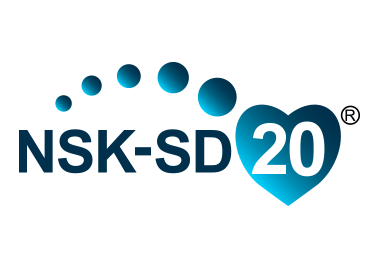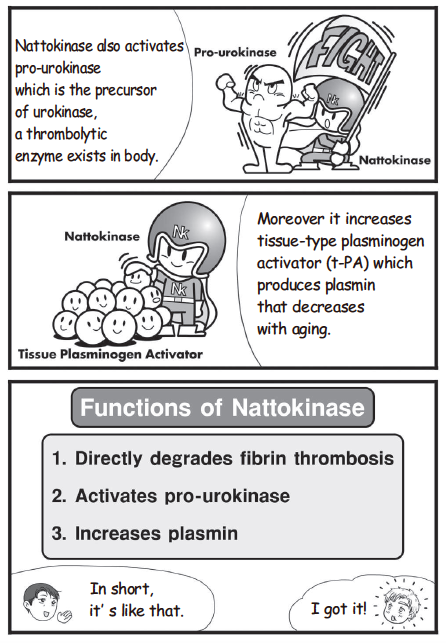
NSK-SD and Thrombosis
The Fibrinolytic Effect and Coagulation Inhibitory Effect
We currently have 7 human clinical and 7 non-human studies showing the fibrinolytic and anti-coagulation properties of NSK-SD.
NSK-SD is a fibrinolytic enzyme, which means it degrades fibrin. Fibrin the main component of a blood clot, and is a protein that creates a web-like mesh that traps and binds together red blood cells. NSK-SD is very effective at directly degrading fibrin, as seen in the images below that show a drop of NSK-SD placed on a dish of fibrin.
NSK-SD has also shown to indirectly degrade fibrin by helping increase and activate our body’s natural fibrin-degrading factors such plasmin, tPA, and pro-urokinase. However, NSK-SD does not increase the time it takes for a good blood clot to form in response to a wound.
LIST OF STUDIES:
Sumi et al. 1990 - In 12 healthy women and men, after consumption of NSK compared to control, enhancement of plasma fibrinolytic activity was maintained for up to 8 hours measured by the EFA and ELT tests.
Sumi et al. 1990 - In 9 dogs, a local clot was induced. The control group showed no sign of lysis of clot 18 hours later, but the nattokinase group showed completely restored blood circulation within 5 hours through fibrinolytic activity.
Sumi et al. 1990 Part B - In 7 healthy volunteers, Fibrin Degradation Products spiked on day 1 showing degradation of present blood clots, then decreased slowly over 8 days as the number of present blood clots decreased. TPA (an important factor for degrading blood clot) increased on days 4 and 8 compared baseline.
Sumi & Maruyama 1998 - In 5 healthy women and men, fibrinolytic activity increased 4 to 8 hours after consumption of NSK compared to baseline. Fibrin degradation products increased 6,8 hours compared to baseline.
Hsia et al. 2009 - 45 men and women given nattokinase daily for 8 weeks saw a decrease in plasma levels of fibrinogen, factor VII and factor VIII, which are each components involved in creating a blood clot.
Fujita et al. 1995 - Nattokinase is less sensitive on the cleavage of fibrinogen, but is more sensitive on the cleavage of cross-linked fibrin compared to plasmin, which means it may be safer than plasmin as it will degrade existing blood clots but will not prevent good blood clots to heal wounds.
Kurosawa 2015 - In 12 young males, D-dimer concentrations and blood fibrin/fibrinogen degradation products were elevated significantly after administration on NSK-SD. Factor VIII activity declined, blood antithrombin concentration was higher, and activated partial thromboplastin time prolonged. Therefore, a single dose of nattokinase enhanced fibrinolysis and anti-coagulation via several different pathways simultaneously. However, Prothrombin Time was not affected showing that NSK-SD does not increase the time it takes for a good blood clot to form in response to a wound.
Urano 2007 - In 45 slightly overweight individuals, the fibrinolytic effect in the nattokinase group compared to the placebo group was not significant. However, when limited to participants with BMI higher than average (25), there was a significant decrease in PAI-1, an inhibitor of plasmin.
Suzuki et al. 2003 - Nattokinase reduced development of intimal thickening following endothelial injury in rat femoral artery compared to control (p<0.05) and did not prolong bleeding time.
Ninomiya et al. 2008 - NSK-SD was administered to patients taking Warfarin daily for 26 weeks. No adverse effects were observed when taken with Warfarin. Lower rates of change in PT and PT-INR compared to placebo were reported as well as APTT and PT closer to reference values for subgroup over 61 years old after 4 month (p<0.05). This means NSK-SD can help stabilize the effects of Warfarin on the coagulation-fibrinolytic system.






